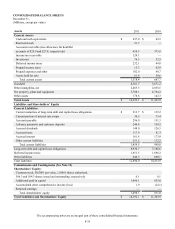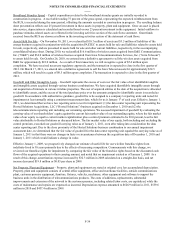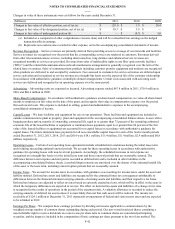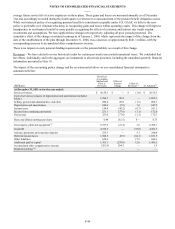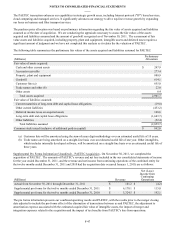Windstream 2011 Annual Report Download - page 146
Download and view the complete annual report
Please find page 146 of the 2011 Windstream annual report below. You can navigate through the pages in the report by either clicking on the pages listed below, or by using the keyword search tool below to find specific information within the annual report.
F-38
NOTES TO CONSOLIDATED FINANCIAL STATEMENTS
1. Background and Basis for Presentation:
Unless the context requires otherwise, the use of the terms “Windstream,” “we,” “us” and “our” in this Annual Report on
Form 10-K refers to Windstream Corporation and its consolidated subsidiaries.
Description of the Business - We are a leading provider of advanced communications and technology solutions, including
managed services and cloud computing, to businesses nationwide. In addition to business services, we offer broadband, voice
and video services to consumers in primarily rural markets. We have operations in 48 states and the District of Columbia, a
local and long-haul fiber network spanning approximately 115,000 miles, a robust business sales division and 21 data centers
offering managed services and cloud computing.
Basis of Presentation – The preparation of financial statements, in accordance with accounting principles generally accepted in
the United States (“U.S. GAAP”), requires management to make estimates and assumptions that affect the reported amounts of
assets, liabilities, revenues and expenses and disclosure of contingent assets and liabilities. The estimates and assumptions used
in the accompanying consolidated financial statements are based upon management’s evaluation of the relevant facts and
circumstances as of the date of the consolidated financial statements. Actual results may differ from the estimates and
assumptions used in preparing the accompanying consolidated financial statements, and such differences could be material.
Certain prior year amounts have been reclassified to conform to the current year financial statement presentation. These
changes and reclassifications did not impact net or comprehensive income.
2. Summary of Significant Accounting Policies and Changes:
Significant Accounting Policies
Consolidation of Financial Statements – Our consolidated financial statements include our accounts and the accounts of our
subsidiaries. All affiliated transactions have been eliminated.
Cash and Cash Equivalents – Cash and cash equivalents consist of highly liquid investments with original maturities of three
months or less.
Restricted Cash – Restricted cash consists of cash restricted for uses other than current operations. We have placed cash into
pledged deposit accounts for our share of committed spend on construction contracts currently under review by the Rural
Utilities Service (“RUS”) for broadband stimulus grants. Changes in the restricted cash balances are reflected as cash inflows
or outflows in the investing activities section of the statement of cash flows. Additionally, in connection with the acquisition of
PAETEC Holding Corp. ("PAETEC"), we assumed responsibility for letter of credit agreements between PAETEC and their
financial institution. These letter of credit agreements, which require cash collateral, relate to contracts entered into by
PAETEC in the normal course of business. Approximately $9.9 million was remaining in restricted cash associated with these
letters of credit at December 31, 2011.
Accounts Receivable – Accounts receivable consist principally of trade receivables from customers and are generally unsecured
and due within 30 days. Expected credit losses related to trade accounts receivable are recorded as an allowance for doubtful
accounts in the consolidated balance sheets. In establishing the allowance for doubtful accounts, we consider a number of
factors, including historical collection experience, aging of the accounts receivable balances, current economic conditions and a
specific customer’s ability to meet its financial obligations. When internal collection efforts on accounts have been exhausted,
the accounts are written off by reducing the allowance for doubtful accounts. Concentration of credit risk with respect to
accounts receivable is limited because a large number of geographically diverse customers make up our customer base. Due to
varying customer billing cycle cut-off, we must estimate service revenues earned but not yet billed at the end of each reporting
period. Included in accounts receivable are unbilled receivables related to communications services of $98.2 million and $35.2
million at December 31, 2011 and 2010, respectively.
Inventories – Inventories consist of finished goods and are stated at the lower of cost or market value. Cost is determined using
either an average original cost or specific identification method of valuation.
Prepaid Expenses and Other Current Assets – Prepaid expenses and other current assets consist of prepaid services, rent
insurance, maintenance contracts and refundable deposits. Prepayments are expensed on a straight-line basis over the
corresponding life of the underlying agreements.









